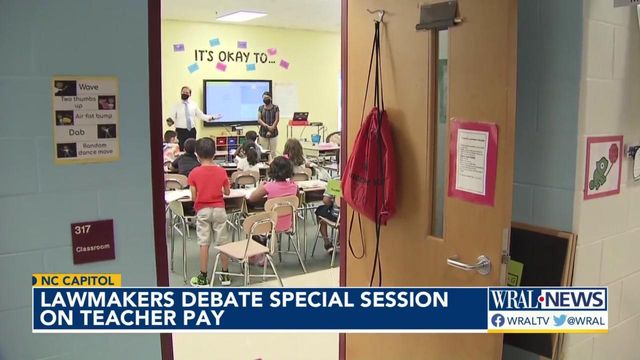Democrats call for action as vacancies among NC K-5 teachers jump by 65% this year
Thousands of students who return to their classrooms for the new school year on Monday won't have permanent teachers leading their classes yet.
Posted — UpdatedAmong teachers and school staff, vacancies were about 27% higher than last year. Vacancies among teachers in kindergarten through fifth grade have increased by 65% in North Carolina this year compared with last year, according to data from the North Carolina School Superintendents' Association.
Some North Carolina lawmakers say that the state needs to step up and help fill those vacancies. North Carolina Sen. Dan Blue, D-Wake, said there are more than 11,000 positions in state schools open.
He said it's absurd that the state is sitting on billions of dollars in reserves while schools can't pay enough to hire teachers they desperately need.
How NC teacher pay compares to other states
Democrats call for fast action
Legislators were at the North Carolina General Assembly on Thursday for a skeleton session, but there were no votes scheduled on any bills. Lawmakers are expected to resume work in September, but that will be after school starts.
Blue says lawmakers shouldn't wait that long.
"We’re in session and if we decide we can start addressing these issues," Blue said. "We don’t have to wait till January. It’s critical enough. The alarms are going off."
Democrats are in the minority in the North Carolina House and Senate, so they are unable to call the legislature back into session or set the policy agenda. But caucus leaders Blue and State Rep. Robert Reives, D-Chatham, said teacher vacancies shouldn't become a partisan issue.
"In fact, we’re sitting on billions of dollars in reserves, while students are going back to class without teachers or other essential employees that make our schools work," Reives said. "We as legislators have the ability to provide more resources to these so we can recruit and retain the best possible teachers and school staff for our students."
They also said lawmakers should consider funding free education programs to help recruit more teachers. The number of teachers graduating from education programs in North Carolina has been dropping for years.
Moore noted that lawmakers raised teacher pay by an average of 9.2% over the biennium and are likely to increase pay even more next year. The vacancies and elevated inflation are key factors.
“I do think this is something that we'll look at when we come back in session next year,” Republican House Speaker Tim Moore said. “... I really want to look at other ways that we can incentivize teachers to stay in the profession [and] to draw in new teachers,” he added.
Moore also said he’d also like to examine how to remove barriers that might prevent retired teachers from returning to the classroom.
“A lot of retired teachers are saying they want to come back and they want to be able to help but they don't want to get overly penalized on their retirement,” Moore said. “So I think it needs to be a myriad of solutions.”
Dems: Teachers have been demonized by politicians
Blue said he's hearing from teachers that they aren't leaving the profession only because of low salaries. He said teachers are leaving because they’re being disrespected and even demonized by so many politicians.
"Should we be making them go on bookshelves and take books off the shelves? Should we make them the enemy of the public ... based on misinformation?" he asked.
Moore said he had not heard any teachers say they’re leaving the profession because of the political climate. He chalks it up to burnout from the pandemic.
"I share the same concerns as everyone about the teacher shortage right now," Moore said. "But, you know, it's a national issue. You look at states like, say, Wisconsin, even spends more on education pays even more than we do for teachers. They're having an even more severe teacher shortage than we are."
Related Topics
• Credits
Copyright 2024 by Capitol Broadcasting Company. All rights reserved. This material may not be published, broadcast, rewritten or redistributed.





